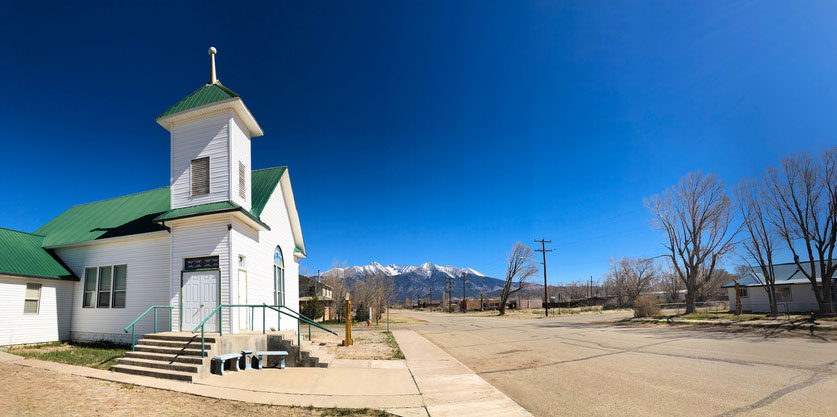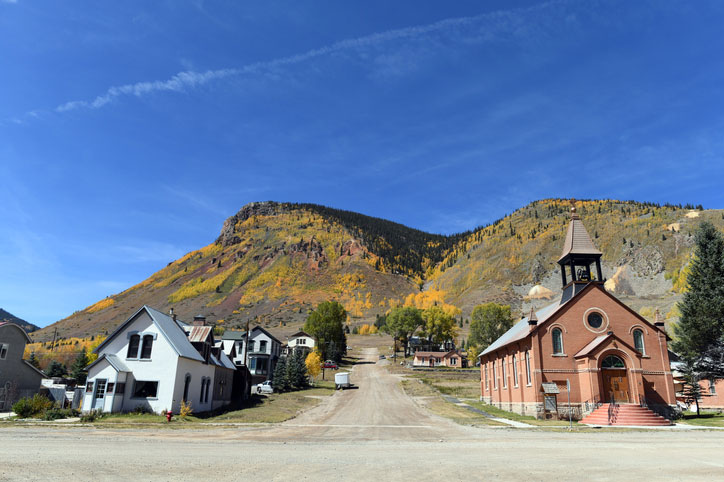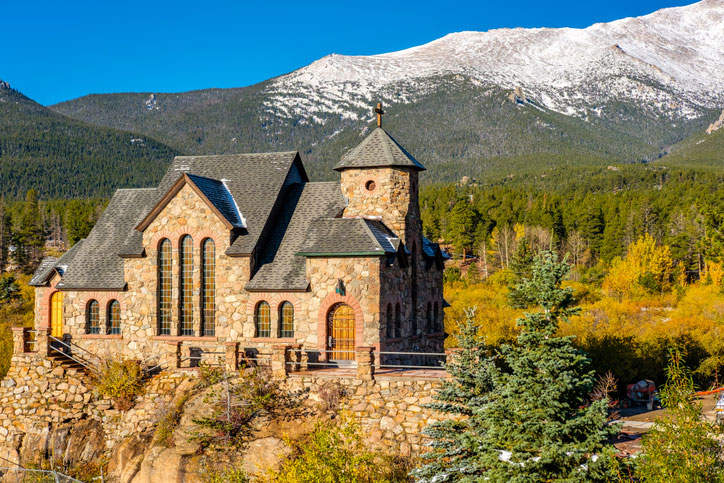
24 years ago a family felt called to start a ministry and they began holding after-hour services in a small elementary school near the eastern foothills of the Rockies. It wasn’t easy organizing prayer groups with five small children to raise, yet year after year with perseverance and the help of the Lord the group of worshipers grew.
Today Jubilee Fellowship Church is well-over a thousand members strong and is responsible for planting several additional houses of worship throughout the South Denver area. The future is open and exciting for the husband-and-wife lead pastor team at Jubilee, who are excited to share the authentic presence of Jesus with all who are open, especially the upcoming younger generation.

Explore a Christian Ministry Degree – Request More Info Today!
For those who feel the call to ministry, your story could be similar. This is especially true for those who wish to pursue such a path in the state of Colorado, which is well-primed for aspiring Christian leaders to get the preparation they need and the resources they’ll require to start a thriving career as a pastor.
Colorado is home to many thriving Christian communities that will provide excellent opportunities for aspiring ministers.
This isn’t to say that it will come with a snap of the fingers; rather, arriving at the honorable position of a pastor requires great dedication and work. However, your efforts will pay off greatly. With a combination of education, experience, and a little legal know-how you can position yourself on a track that will enable you to effectively fulfill your calling to ministry. Over time with hard work and the ultimate surrender of your ambitions to the will of God, your story can also be one of evangelism, service, outreach, faith, and even church planting. The journey down this path begins with education.
The steps in this guide will explain the education you need and show you exactly how to become a pastor in Colorado.
Steps to Become a Pastor in Colorado
Step 1. Earn a Bachelor’s Degree in Christian Ministry, Pastoral Studies or Other Similar Major in Colorado
A bachelor’s degree in a relevant field like pastoral studies or Christian ministry is the first step in distinguishing yourself from a lay minister. This will give you important foundational knowledge and it’s a great credential to help you get your foot in the door for positions at your local church.
In addition to online options, right now there are at least three colleges in Colorado offering undergraduate degrees in subjects related to pastoral studies. These include bachelor’s degrees in:
- Biblical studies
- Youth ministry
- Religious studies
- Christian ministry
- Ministry management
You can use the knowledge and skills that come with a bachelor’s degree to address any number of issues Colorado is facing: a wave of teen suicides, a 24% increase in drug overdose deaths in a year’s span ending in September 2021, or a housing crisis of nearly 10,000 homeless Coloradans. Hope, good news, and the word of the Lord are out there; the problem is that not enough people are receiving the message.
And you’re answering the call to get God’s word out.
A bachelor’s degree is also a standard prereq for entry into a Master of Divinity or similar advanced degree program, a qualification you’ll need to be well-poised to move into senior ministry positions in the future.

Step 2. Look for Ministry Jobs and Gain Experience Serving the People and Churches of Colorado
You’ve earned a degree: now it’s time to put it to work. You’re a cut above the average layperson who doesn’t have a relevant degree, and that means you potentially have a competitive edge for positions at your local church like:
- Youth associate
- Christian educator
- Small group pastor
- Liturgist
- Information technology specialist
- Ministry associate
Churches across the region are seeking qualified candidates with a verifiable background in a relevant subject area. You’ll be able to combine your bachelor’s degree with more and more experience to develop a solid résumé that takes you right up to the boundary where a master’s degree will unlock higher-level career doors.
- Calvary Worship Center in Colorado Springs
- Canyon View Vineyard Church in Grand Junction
- Cherry Hills Community Church in Highlands Ranch
- Christ Community Church in Greeley
- Church For All Nations in Colorado Springs
- Colorado Community Church in Aurora
- Colorado Community Church in Englewood
- Crossroads Church in Loveland
- Crossroads Church of Denver in Wheat Ridge
- Eastern Hills Community Church in Centennial
- Faith Bible Chapel in Arvada
- Faith Evangelical Free Church in Fort Collins
- First Presbyterian Church in Colorado Springs
- Flatirons Community Church in Lafayette
- Foothills Bible Church in Littleton
- Greenwood Community Church in Greenwood Village
- Jubilee Fellowship Church in Lone Tree
- LifeBridge Christian Church in Longmont
- Mission Hills Church in Littleton
- Mountain Springs Church in Colorado Springs
- New Life Church in Colorado Springs
- Northern Hills Christian Church in Brighton
- Potter's House Church of Denver in Denver
- Red Rocks Church in Golden
- Resurrection Fellowship in Loveland
- Rocky Mountain Calvary Chapel in Colorado Springs
- Rocky Mountain Christian Church in Niwot
- Southeast Christian Church in Parker
- Timberline Church in Fort Collins
- Vineyard Church of the Rockies in Fort Collins
- Woodmen Valley Chapel in Colorado Springs
- Word of Life Christian Center in Lone Tree
Salary Expectations for Church Ministry Jobs in Colorado
In 2020, the average salary for non-leadership positions for religious workers in Colorado was $40,360. The most experienced professionals in this category, earning the top ten percent, made $62,890 or more that year.
The long legacy of Christianity in Colorado
The state of Colorado was settled by a variety of different groups over the course of the nineteenth century, with Christians comprising a majority of these migrants. These early Christian settlers represented a range of orthodoxies, in particular Catholic and Protestant, with a presence that continued to grow during the Gold Rush and beyond. Consequently, Christianity has been a notable part of Colorado culture for over a century, with a presence that can still be found across the state today.
Over the twentieth century, Christian communities continued to spread across the state of Colorado. During the 1920s, some Protestant sects famously held revivals in gatherings so large they could not fit in traditional chapels, therefore requiring tents. Christianity also played a significant role in the formation of suburbs in the 1950s, as churches provided cultural centers around which new communities could find a center.
Some aspects of Christian history in Colorado are less than positive. Before the Civil Rights Movement of the 1960s, many churches were segregated. However, Christians in Colorado have worked hard to create more equal and inclusive communities for anyone who wishes to worship today.
These are just a few examples of the role Christianity has played in the development of Colorado’s cultural identity. Today, the state is home to a wide variety of Christian communities, including Protestants, Catholics, Mormons, Eastern Orthodox Christians, and Jehovah’s Witnesses, among others. As a pastor in Colorado, you will get to join this fascinating history and continue to contribute to what it means to be Christian in the Centennial State.
Step 3. Earn a Master of Divinity (MDiv) or Similar Graduate Degree in Colorado and Establish Your Role in Christian Leadership
By now you’ve taken what you learned in your bachelor’s program and put it into practice in real life on the ground. You’ve helped to spread Jesus’ word in roles of increasing responsibility at your own local church. And you’ve engaged in ministry outreach at places like Samaritan House near Coors Field in downtown Denver, or Marian House in Colorado Springs.
You’re ready to take the next step and align yourself for advanced leadership positions in your faith community; perhaps you’re even thinking about starting your own church. This is the time to start applying to a Master of Divinity (MDiv) or other graduate program.
A Master of Divinity degree takes your knowledge to the next level and has a similar effect on your professional credentials. These can be offered as on-campus or online programs; as stand-alone degrees or as programs with a variety of concentrations that allow you to tailor your specialization in areas like:
- Apologetics
- Chaplaincy
- New or Old Testament
- Theology
- Pastoral care
- Biblical preaching
Your time in graduate school is an exciting time that places you within a supportive group of classmates while you collectively see the bigger picture of God’s plan as scriptural truths start to come into focus.
You’ve experienced what it’s like in entry and mid-level positions at your local faith community; now it’s time to prepare for leadership roles that come with a greater level of responsibility and put you in a position to lead and counsel people in your church community:
- Stewardship ministry
- Senior pastor
- Missions pastor
- Senior adult pastor
- Lead outreach pastor
- Evangelical director
- Executive director
Salary Expectations for Pastor Jobs in Colorado
In 2022, clergy members in Colorado earned an average of $61,400, placing the state among the top 10 in the nation for salaries among Christian leaders. More experienced members of clergy, earning in the top ten percent, made $93,530 or more that year.
Earning an average salary of $64,700, religious directors also do very well in Colorado. In fact, church directors in the Denver metro area earn the fourth-highest average salary of all metropolitan areas in the nation, at $56,030. Those at the top of their field, earning in the 90th percentile, made more than $101,650 that year.

Step 4. Consider Forming a Christian Ministry of Your Own in Colorado
Senior pastors understand how a profession can be both extremely fulfilling, and at the same time extremely challenging. But for some the calling doesn’t stop there. You may feel compelled to start your own faith community, a calling that’s especially present among pastors at an advanced stage in their careers.
This is a journey of faith in itself, which is why going into it with open eyes about the legal and accounting issues is important.
There are two angles you need to consider when incorporating your church as a non-profit organization: Colorado’s state regulations and the federal regulations with the IRS.
At the state level:
- Your first step is to choose a name for your church. Check the Colorado Secretary of State’s business database to confirm that your name isn’t being used by another entity.
- Next file Articles of Incorporation for a non-profit and related forms with the Colorado Secretary of State. These describe your church’s governance and management system. You’ll also need to establish bylaws and a conflict-of-interest policy, and these should be based on your Articles of Incorporation.
At this point you can start your 501(c)(3) application with the IRS that establishes your church as a non-profit charitable organization. To do this:
- Apply for an Employer Identification Number (EIN) using an SS-4 Form.
- Submit your Articles of Incorporation, bylaws, and conflict of interest policy to the IRS. You also need to draft a Declaration of Trust that describes how your church’s assets will be distributed.
- Submit a Form 1023 to the IRS ($275 fee); this is your official application for non-profit 501(c)(3) status.
While you’re waiting for your IRS 501(c)(3) status to be approved, you’ll need to circle back and complete the remaining Colorado state-level requirements:
- Apply for a Colorado Sales Tax and Withholding Account (charitable) with the Colorado Department of Revenue.
- If you plan to hire employees you need to file for an unemployment insurance account with the Colorado Department of Labor and Employment.
- Finally, you’ll want to submit an application for sales tax exemption and a non-profit church statement to the Colorado Department of Revenue.
- Once you have all this taken care of, your last step is to register your church as a charitable organization with the Colorado Secretary of State, a process you can complete online.
While it might seem like a lot of paperwork, if you take the forms one at a time it’s just a matter of working through them. And in the grand scheme of things these are a few small hurdles you can overcome relatively quickly.
With the paperwork out of the way you’ll be able to devote yourself to fulfilling your calling full-time, planting your own church and making Jesus’ name known throughout your local region and perhaps one day across the state. And why stop there?
2022 US Bureau of Labor Statistics salary figures and job market trends for Religious Workers, Church Directors, and Clergy based on state data, not school-specific information. Conditions in your area may vary. Data accessed July 2023.
Christian Colleges in Colorado
Colorado Christian University School of Theology
Major in Apologetics and Evangelism (campus)
- Cultural Engagement
- Global Apologetics
- Innovative Evangelism
- Practical Apologetics
BA in Biblical Studies with Language (campus)
BA in Ministry Management (campus)
BA in Theology (campus)
BA in Youth Ministry (campus)
BA in Christian Ministry (online)
BS in Organizational Management in Christian Leadership (online)
BA in Biblical Studies (online)
MA in Theological Studies (online)
MA in Biblical Studies (online)
MA in Applied Apologetics (online)
MA in Executive Leadership in Christian Ministry (online)
Denver Seminary
Master of Divinity (campus, online, hybrid)
- Apologetics and Ethics
- Biblical Preaching
- Biblical Studies
- Chaplaincy
- Christian Formation and Spiritual Direction Leadership
- New Testament
- Old Testament
- Pastoral Care and Counseling
- Theology
MA (campus, online, hybrid)
- Apologetics and Ethics
- Biblical and Theological Studies
- Christian Formation
- Christian Studies
- Counseling Ministries
- Cultural Engagement
- Leadership
- New Testament
- Old Testament
- Theology
Master of Theology (campus, online, hybrid)
- New Testament
- Old Testament
- Theology
Iliff School of Theology
Master of Divinity (campus, online, hybrid)
MA in Pastoral and Spiritual Care (campus, online, hybrid)
Master of Theological Studies (campus, online, hybrid)
Naropa University
BA in Religious Studies (campus)
Master of Divinity (campus, online)
- Tibetan Tradition emphasis
Nazarene Bible College
BA in Ministry (online)
- Bible and Theology
- Christian Educational Ministries
- Counseling for Christian Ministries
- Hispanic Pastoral Ministries
- Leadership and Ethics
- Pastoral Leadership
- Pastoral Ministries







